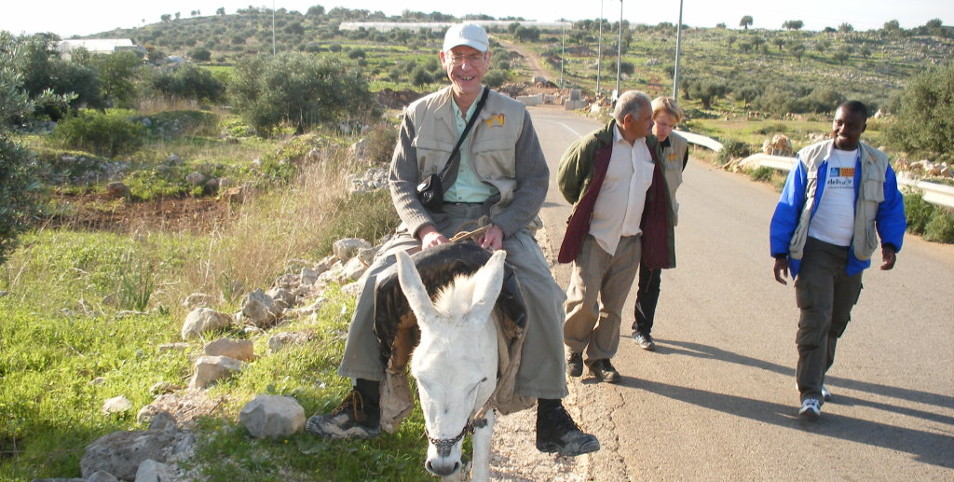Bersim lives in the tiny Palestinian village of Tawayel, near to Aqraba on the West Bank. He has 10 children, but if you ask him how many grandchildren he has, he laughs because he has no idea at all! We met two of his grandchildren – beautiful, identical twin boys, aged about two, who obviously love their Grandpa very much.
But Bersim and his family live under a great black cloud. Last Sunday four Israeli army jeeps drew up outside his house and the soldiers demanded to speak to him. They presented him with a paper which stated that his house was going to be demolished. “This is Israeli land,” they said, “and we want to see no Palestinians here.” They explained that the army has designated the area around Tawayel as a military training area, so all local housing has to be demolished. They also stated that the house was built without a permit, although Bersim knows from experience that permits are impossible to obtain. “And you will have to pay for the hire of the bulldozer too,” the soldiers added, as they gave him similar papers to distribute to his neighbours. “You can live in the caves,” the soldiers went on. Some Palestinians in this area do in fact build houses around caves. Nevertheless, this is a deeply offensive suggestion and, as Bersim pointed out, it is also wholly unrealistic given the large size of his family.
Tawayel is in “Area C” which means that, even though it is not part of Israel, it is controlled entirely by the Israeli army. They can (and do) do whatever they like. This is the reality of Occupation. Nearby Israeli settlements are permitted, or rather encouraged, to build, but not Palestinians.
Bersim, and his father before him, have grown wheat and kept sheep on their land here for many years. But sadly, demolition is no new experience for Bersim. It has happened three times before, in 2007, 2008 and 2009 and each time he and his family have rebuilt their homes, living in tents in the meantime.
Bersim has engaged a Palestinian lawyer to fight his case in the Israeli High Court. This will cost 30 000 shekels (£5500). 10 000 shekels will be found by the local community in Aqraba. The remaining 20 000 shekels will be provided by the lawyer, who has access to funds for such cases. He also has links with an Israeli lawyer who may be able to help.
House demolitions are only one form of harrassment suffered by Bersim and his neighbours. Wheat has been burnt. Sheep have been taken and a “ransom” of 55 shekels per sheep demanded. A friend’s tractor was removed and 5000 shekels was demanded for its return. Last year Bersim’s wife single-handedly prevented soldiers from removing their tractor.
Bersim’s two little grandsons know nothing of politics, but even at their tender age they have already experienced the heavy hand of Israeli occupation. And there seems every prospect that they will experience it again and again in the future.
